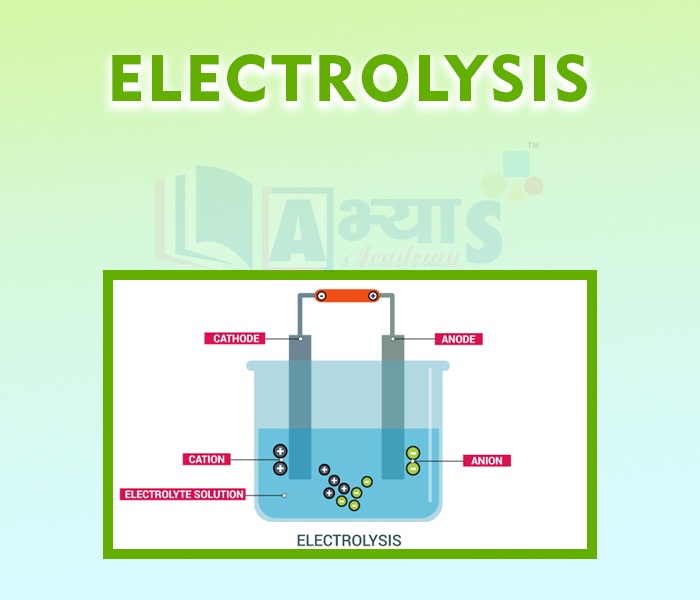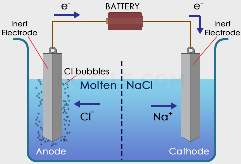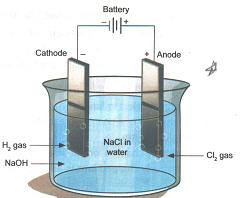Electrolysis







Electrolysis
Electrolysis:
|
In the diagram, rods are made of conducting material (called electrodes). The electrode connected to the negative terminal of battery is called cathode and the one connected to positive terminal of battery is called anode. The liquid that conducts electricity because of presence of ions is called electrolyte. Examples are: salt solution, dilute solution of acids. A process called electrolysis occurs in an electrolytic cell when a current is passed through the electrolyte. |
 |
The production of a chemical reaction by passing an electric current through an electrolyte is called electrolysis. An electrolyte contains ions, which are charged. The positively charged ions are called cations, because they are attracted to the cathode, and the negatively charged ones are called anions, because they are attracted to the anode. We know that unlike charges attract and like charges repel. A chemical reaction takes place at the anode and the cathode. This can be observed as formation of bubbles or decomposition of metal on electrodes.
The oxygen bubbles are formed on the electrode (called anode) connected to the positive terminal of the battery and hydrogen bubbles are formed on the other electrode (called cathode) connected to the negative terminal of the battery.
We thus, conclude that the passage of an electric current through an ionic solution causes chemical changes.
 |
 |
In electrolysis: | |||
| Right Option : B | |||
| View Explanation |
Cathode is ___________________________ | |||
| Right Option : B | |||
| View Explanation | |||
Splitting an ionic compound using electricty is called __________________ | |||
| Right Option : A | |||
| View Explanation | |||
Students / Parents Reviews [10]
I have spent a wonderful time in Abhyas academy. It has made my reasoning more apt, English more stronger and Maths an interesting subject for me. It has given me a habbit of self studying

Yatharthi Sharma
10thIt was a good experience with Abhyas Academy. I even faced problems in starting but slowly and steadily overcomed. Especially reasoning classes helped me a lot.

Cheshta
10thMy experience with Abhyas is very good. I have learnt many things here like vedic maths and reasoning also. Teachers here first take our doubts and then there are assignments to verify our weak points.

Shivam Rana
7thBeing a parent, I saw my daughter improvement in her studies by seeing a good result in all day to day compititive exam TMO, NSO, IEO etc and as well as studies. I have got a fruitful result from my daughter.

Prisha Gupta
8thAbhyas is a complete education Institute. Here extreme care is taken by teacher with the help of regular exam. Extra classes also conducted by the institute, if the student is weak.

Om Umang
10thAbhyas Methodology is very good. It is based on according to student and each child manages accordingly to its properly. Methodology has improved the abilities of students to shine them in future.

Manish Kumar
10thAbout Abhyas metholodology the teachers are very nice and hardworking toward students.The Centre Head Mrs Anu Sethi is also a brilliant teacher.Abhyas has taught me how to overcome problems and has always taken my doubts and suppoeted me.

Shreya Shrivastava
8thIt was good as the experience because as we had come here we had been improved in a such envirnment created here.Extra is taught which is beneficial for future.

Eshan Arora
8thOne of the best institutes to develope a child interest in studies.Provides SST and English knowledge also unlike other institutes. Teachers are co operative and friendly online tests andPPT develope practical knowledge also.

Aman Kumar Shrivastava
10thIt has a great methodology. Students here can get analysis to their test quickly.We can learn easily through PPTs and the testing methods are good. We know that where we have to practice
